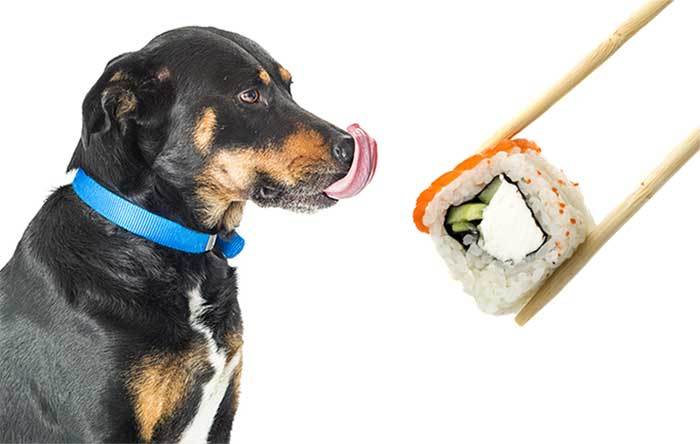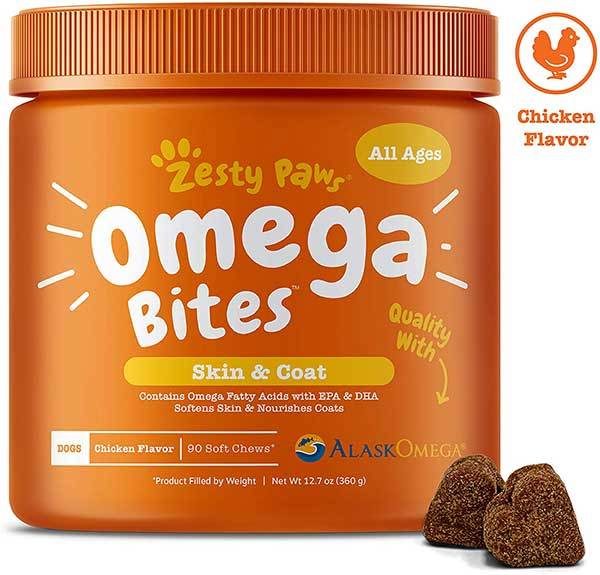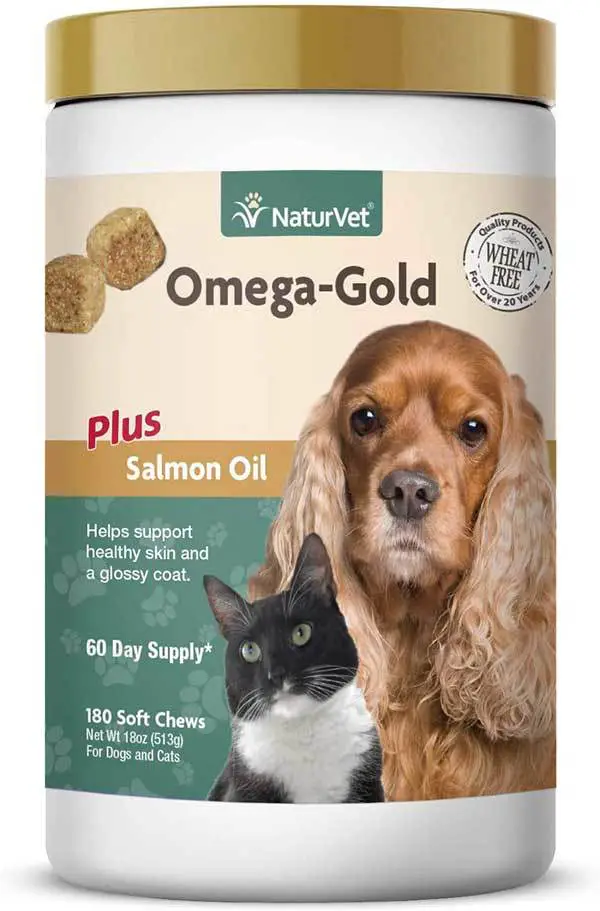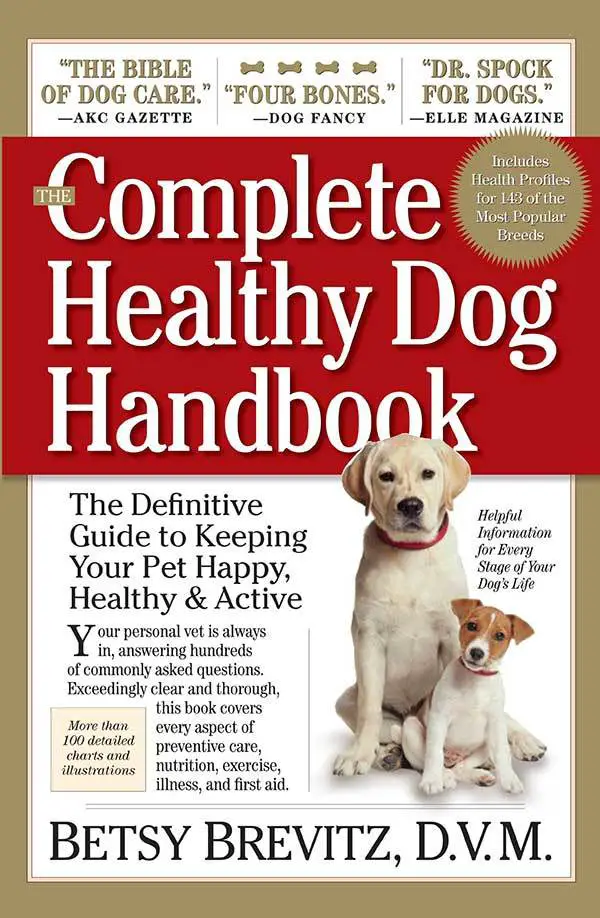If you love seafood, the chances are that you’ve already tried, or regularly eat, sushi. This Japanese dish is highly-nutritious and incredibly delectable, making it one of the most sought-after seafood today.
Sushi also has a strong, inviting aroma. As such, it’s almost impossible to enjoy it without drawing the attention and curiosity of your dog.
If you’re used to offering human foods to your canine friend, you may be wondering to yourself, can I give my dog sushi?
Before you do, it’s prudent to find out what experts think about the whole issue of sushi and dogs. So, can dogs have sushi?
The answer to that question is yes, but with a few caveats. Like most human foods, dogs can have sushi only in moderation, and depending on the ingredients used.
But what are those sushi ingredients considered safe and which ingredients are deemed unsafe for dogs? These, and other relevant questions shall be the focus of this post.
Table of Contents
What Is Sushi?
Sushi is a Japanese dish that’s prepared with vinegared rice as the primary ingredient. Usually, the rice is flavored using sugar and salt, as well as numerous other accompanying ingredients.
Examples of these ingredients include vegetables, seafood (such as yellowtail, tuna, crab, octopus, shrimp, squid, eel, mackerel, or salmon), and tropical fruits.
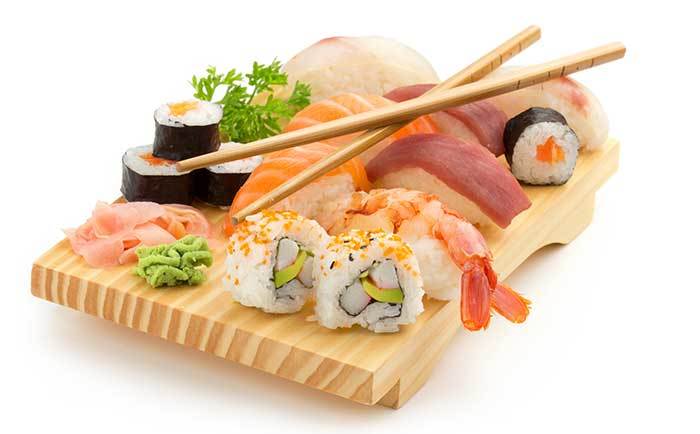
And while the styles and methods of preparation vary with each region, sushi rice, also known as sumeshi or shari, remains the common denominator in almost all sushi dishes around the world.
Originally, the rice used was medium-grain white. But with time, people began to experiment with the more nutritious brown rice.
When ready, the meal is usually served with pickled ginger (also known as gari), soy sauce, and wasabi, as well as garnished using pickled daikon (takuan) and daikon radish.
One thing worth noting is that while sushi is considerably popular in Japanese cuisine, the dish actually traces its roots elsewhere.
It’s believed that sushi originated in Southeast Asia, particularly around the Mekong River, and was popularized in China long before the Japanese caught up with the craze.
Today, the dish is popular all over the world, thanks to its yummy taste and relatively high nutritional profile.
It’s also worth noting that the nutritional value of sushi varies depending on the ingredients used. However, most common sushis have the following nutritional profiles.
1. Avocado Sushi Roll
– 0.3 to 1 gr of protein;
– 1 to 1.5 gr of fat;
– 1 to 1.5 gr of fiber;
– 4 to 5 gr of carbs and;
Around 23 calories.
2. Cucumber Sushi Roll
– 0 fat;
– 0.5 to 1 gr of fiber;
– Around 1 protein;
– Around 5 gr of carbs; and
Around 22 calories
3. Salmon and Avocado Sushi Roll
– 0.5 to 2 gr of fiber;
– 1 to 3 gr of protein;
– 1 to 3 gr of fat;
– 6 to 9 carbs; and
Around 50 calories.
Can Dogs Safely Eat Sushi? A Review of the Ingredients
Having examined what sushi is, you may now be in a dilemma as to whether to offer sushi to your pooch or not.
Indeed, it’s not unusual to come across pet parents asking themselves, can dogs eat sushi and what kind of sushi can dogs eat?
To understand the potential benefits and inherent risks of feeding sushi to your dog, you’ll need to be acquainted with the top ingredients the food contains.
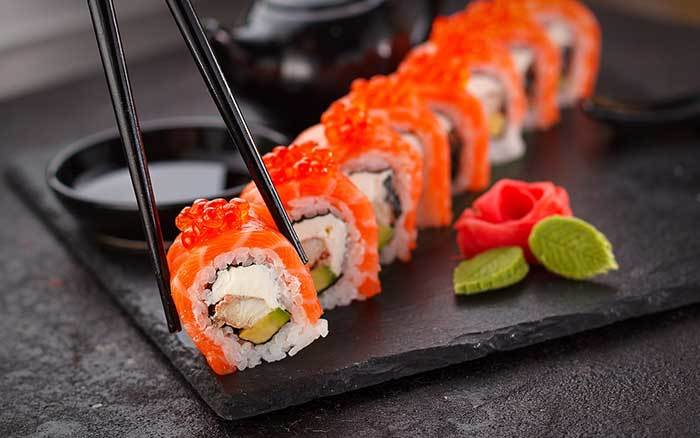
We’ll review some of those ingredients in this section. But even before analyzing sushi ingredients, the first thing that might discourage you about the food is its cost.
Sushi is so expensive that even people that love this dish usually snack on it as an occasional treat. So, that already means that your pooch won’t be eating sushi every other day, which might come as good or bad news, depending on how you look at it.
Apart from being cost-inhibitive, another real danger with offering sushi to dogs comes with raw seafood, particularly raw salmon. Feeding your dog raw seafood might cause the dog to develop severe bacterial or parasitic infections.
Some common parasitic worms that are present in raw salmon include roundworms, tapeworms, and flukes. Flukes are the most poisonous of all the three.
👉 Flukes are associated with a condition known as salmon poisoning, which manifests in symptoms like nausea, vomiting, diarrhea, fever, dehydration, bloody stool, and lethargy. If you don’t take urgent measures to seek treatment for your dog, the animal could die of salmon poisoning.
Your best bet is to freeze raw fish before offering it to your pooch. Freezing is believed to denature the harmful parasites that might be present in the fish, making it safer for the dog to eat.
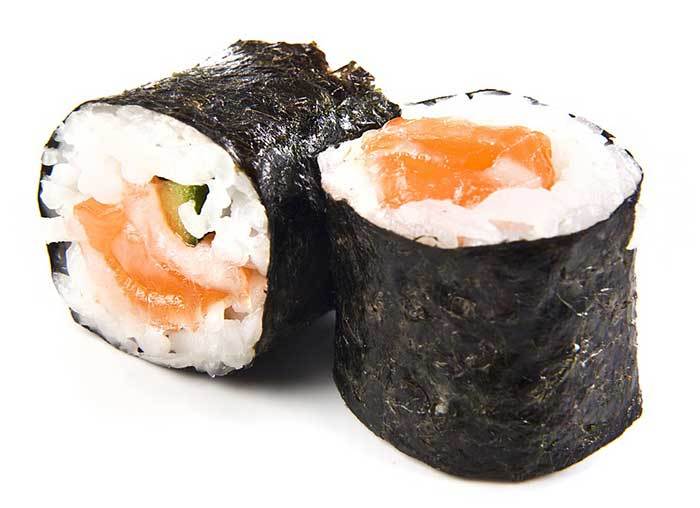
However, it’s reassuring to note that salmon comes with a lot of redeeming features, making it a safe and highly nutritious treat for dogs. The most notable benefit of salmon is its richness in Omega 3 fatty acids.
Omega 3 fatty acids come with a cocktail of health and dietary benefits for dogs. First, it moisturizes and invigorates your dog’s skin and coat.
Dogs that occasionally eat omega 3 fatty acid-rich foods are known to be least susceptible to skin conditions, such as dandruff, itchiness, and skin cancers.
Also, omega 3 fatty acids come with immense antioxidant properties, which makes them useful in combating various diseases.
Supplementing your dog’s diet regularly with these compounds might help to keep the dog safe from chronic infections, such as cancer, diabetes, obesity, and arthritis.
According to various studies conducted on humans and animals, omega 3 fatty acids were found to be remarkable at combating arrhythmias, high blood pressure, and other cardiovascular complications.
That makes them excellent at promoting the health of your dog’s heart. Omega 3 fatty acids are also hailed for their powerful analgesic, anti-inflammatory, and anti-allergy properties.
ALSO READ: Can Dogs Eat Tuna Fish? Everything You Need To Know
So, can dogs eat salmon sushi?
In light of the information we’ve presented above on salmon, you might still be asking yourself, can my dog eat salmon sushi?
Yes, they can, and the dog will significantly benefit from salmon’s highly-nutritious and disease-combatting omega 3 fatty acids. Just ensure you cook the salmon to rid it of any bacteria or parasites.
And what of tuna, can dogs eat tuna sushi?
Like salmon, most other seafood are rich in omega 3 fatty acids. So, tuna sushi is just as safe and recommended for dogs.
The following are other popular sushi ingredients and how they could impact the health of your dog.
1. Eggs
Eggs are perfectly fine for dogs as long as they’re cooked. Avoid raw eggs at all costs.
2. Avocado, Cucumber, Seaweed, Carrots, Bananas, and Mangoes
Can dogs eat avocado sushi? What of bananas, can dogs eat banana sushi? And what do experts have to say about cucumber, can dogs eat cucumber sushi?
👉 All of these ingredients are largely safe for dogs if offered in moderation. However, avoid dried, wild seaweed. Also, avocados contain persin, which is a substance that’s associated with nasal congestion, labored breathing, and an accumulation of fluid around the heart.
So, minimize the use of avocados in sushis before you offer the food to your dog.

3. Spices
Spices, such as wasabi and ginger, are a big no for dogs. Spices might cause your dog serious digestive and gastrointestinal complications. So, can dogs eat ginger from sushi? The answer is, not recommended.
4. Garlic
Garlic is not recommended either. Just a little amount of garlic can cause high toxicity for your pooch.
Symptoms of garlic poisoning include stomach upset, drooling, vomiting and diarrhea, abdominal pains, and anemia-like symptoms.
5. Sugars
Sugar are associated with weight gain and diabetes. So, minimize or eliminate sugar from any sushi that you offer to your dog.
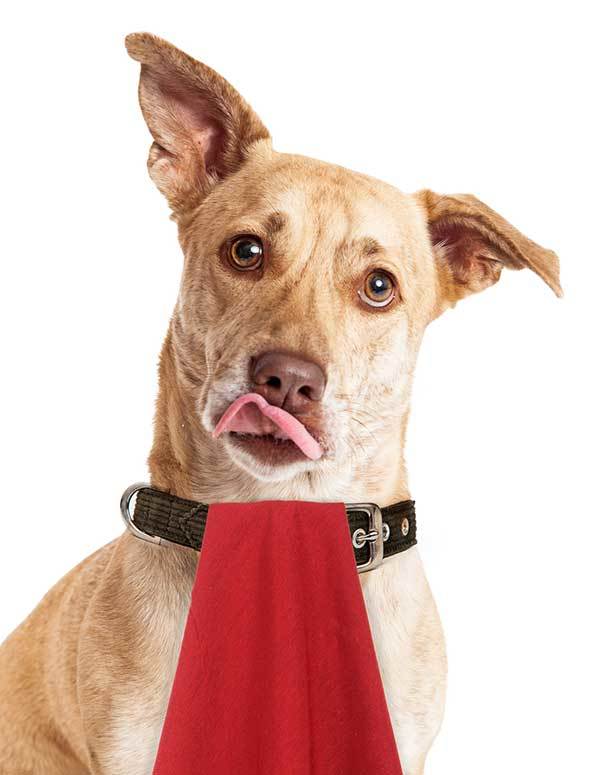
6. Salt
Consuming exceedingly high levels of salt is associated with frequent thirst sensation. Unchecked amounts of salt in a dog’s diet may also lead to sodium ion poisoning.
Symptoms include nausea, vomiting, diarrhea, elevated body temperature, body tremors, seizures, and depression.
Last but not least, your dog might also develop sushi allergy. And these allergies manifest in different symptoms, such as;
– Skin rash;
– Loss of hair;
– Itchy and/or dry skin;
– Runny eyes and/or nose;
– GI symptoms, such as vomiting and diarrhea;
– Excessive self-licking and/or chewing;
– Ear infection; and
– Dehydration.
When Is Sushi Considered Safe For Dogs?
While sushi contains numerous ingredients that experts discourage for dogs, there are certain situations when the food might be considered safe.
First, if the dog has a strong immune system and is not presently dealing with any issues of worms, then you can comfortably give it sushi.
However, ensure that you cook the seafood used to eliminate the risks of contracting bacterial infections or parasitic worms.
ALSO READ: Can Dogs Eat Bread? Everything You Need To Know
Can dogs eat sushi-rice?
There’s a common misconception that rice isn’t great for dogs. However, experts observe that dogs can eat both white and brown rice.
Rice can help to alleviate stomachache and other digestive issues. But like salmon, ensure that the rice is properly cooked before you offer it to your dog.
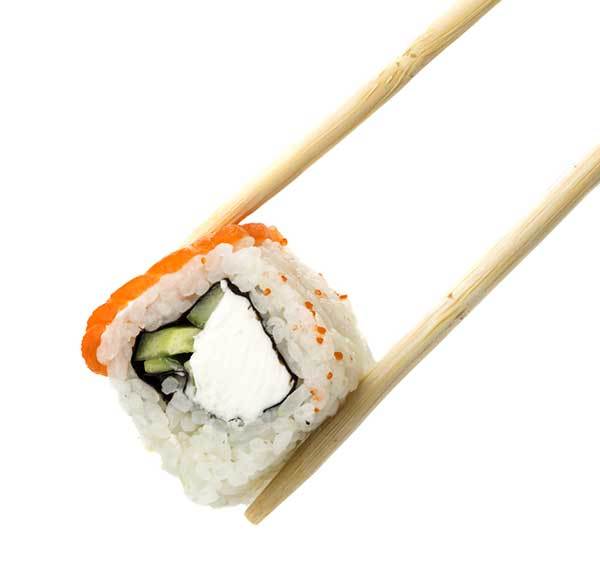
When it comes to cooking sushi, one question that might emerge is the recommended methods of preparation. And in light of that, can dogs eat fried sushi?
Fried sushi is one of the most delicious forms of all cooked sushis, but the problem lies in the amount of fat we often use. If you can minimize the fat, then fried sushi is just okay for your dog. Alternatively, consider boiling the sushi instead.
Another situation when sushi is considered ideal for dogs is if you offer the food to your pooch the right way. And you may be wondering, what is the best way to feed sushi to dogs?
Indeed, one of the frequently asked questions by pet parents relates to how to feed dogs sushi safely. The conventional wisdom is to shun sushi bars for dogs, or other pre-packages sushi products. If you must give your dog pre-packaged sushi, ensure it’s free from all harmful ingredients.
Your best bet is to feed your dog homemade sushi and as we’ve already indicated, the food must be properly cooked, preferably boiled in plain water.
The good news is – there are numerous healthy homemade dog-friendly sushi recipes that you can try and ensure your pooch only consumes safe and healthy sushi.
Another common concern is whether all dogs can eat sushi, and pet parents with pregnant dogs might be wondering, can pregnant dogs eat sushi?
Sushi is generally unideal for very young, very old, sick, or pregnant dogs. That’s because these dogs have compromised immune systems which may be incapable of handling the risks associated with sushi.
ALSO READ: Can Dogs Eat Pickles? (Should or Should Not?)
Conclusion: Can Dogs Eat Sushi?
Sushi is not entirely harmful to dogs. However, beware of the toxic ingredients that most sushi recipes contain.
If you can, avoid sushi altogether and substitute it with other healthier treats. But if you insist on feeding the food to your canine friend and are wondering, how much sushi can dogs eat?
Well, the general rule is to give your dog sushi as an occasional treat, ensuring the dish is properly cooked and served without seasoning or other potentially harmful ingredients.

